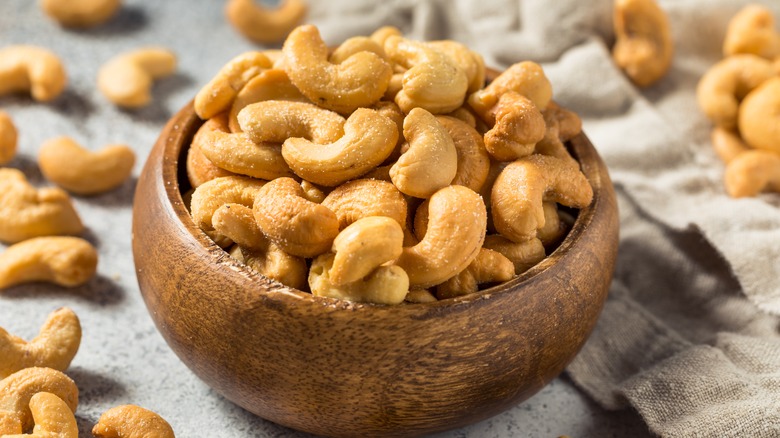Eating Cashews Before Bed Has A Little-Known Effect On Your Sleep
Sleep is trending. People in the United States are getting more sleep now than in the past 20 years, according to The Washington Post. You probably already know the standards of good sleep — aim for seven to nine hours, adopt a bedtime ritual, avoid screens within an hour of bedtime, and try to keep a consistent sleep schedule.
Every once in a while, your mind and body can be too wound up for bed and no yoga or breath practice can calm your anxiety. You could choose melatonin or Benadryl to help you fall asleep, but your experience reminds you of how groggy you felt the next morning. You could also try the Sleepy Girl Mocktail, but you don't have the tart cherry juice. While eating a full meal before bedtime isn't a great idea, some foods could help your sleep. Try eating a handful of cashews before bed because the magnesium might help you sleep.
The effect of magnesium in cashews
An ounce of cashews (about a handful) has 157 calories, which isn't a bad snack just before bed. Most of those calories are from unsaturated fats, which is good for lowering your cholesterol. Even though you'll have less than 2 grams of sugar, you won't have to worry about any blood sugar spikes because of the 5 grams of protein and about a gram of fiber to slow down digestion. The key nutrient in cashews is 83 milligrams of magnesium. That's about 20% of your recommended daily amount.
Magnesium is a mineral that can help sleep in a few ways. It binds to the GABA receptors in your body to calm your nervous system. Magnesium also relaxes your muscles by reducing the calcium in your muscle cells. A lack of magnesium in your diet could lower levels of melatonin that helps you sleep. On the other hand, magnesium might also reduce cortisol levels in your system.
A 2022 study in Sleep asked people about their diet and intake of magnesium. Those who had the most magnesium in their diets reported better sleep quality and were less likely to sleep fewer than seven hours a night.
Other nutrients in cashews that help with sleep
Even though cashews aren't considered to be a complete protein, you'll find certain amounts of your essential amino acids. A serving of cashews has 29% of your daily recommended amount of tryptophan. Tryptophan is that amino acid that many people blame for their post-Thanksgiving turkey fatigue. If taken on an empty stomach, tryptophan is used to make the neurotransmitters melatonin and serotonin.
Iron is another mineral in cashews. Your body needs iron to make red blood cells and hormones, and iron also metabolizes monoamines in your brain that play a role in the physiology of sleep. According to a 2020 review in Sleep Medicine Reviews, iron deficiency has been linked to sleep problems such as restless legs syndrome, sleep-disordered breathing, general sleep disturbances, and ADHD-related sleep disorders. Taking iron supplements reduces some of these sleep disorders. Adult men and women over 50 need 8 milligrams of iron a day, and women under 50 need 18 milligrams. Cashews have almost 2 milligrams of iron.



